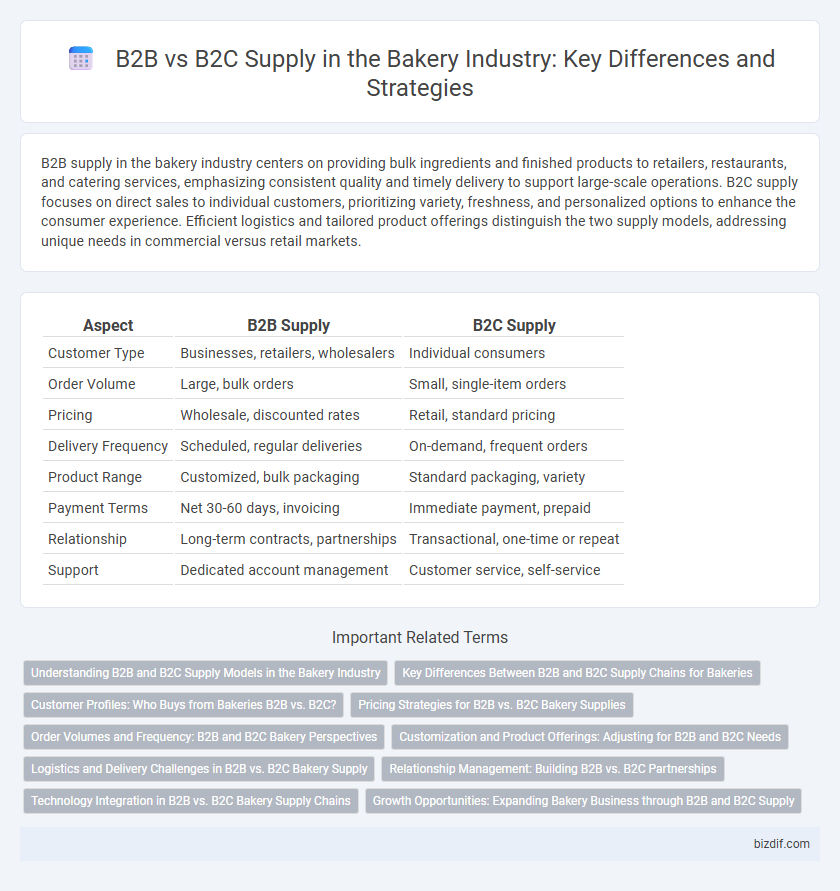B2B supply in the bakery industry centers on providing bulk ingredients and finished products to retailers, restaurants, and catering services, emphasizing consistent quality and timely delivery to support large-scale operations. B2C supply focuses on direct sales to individual customers, prioritizing variety, freshness, and personalized options to enhance the consumer experience. Efficient logistics and tailored product offerings distinguish the two supply models, addressing unique needs in commercial versus retail markets.
Table of Comparison
| Aspect | B2B Supply | B2C Supply |
|---|---|---|
| Customer Type | Businesses, retailers, wholesalers | Individual consumers |
| Order Volume | Large, bulk orders | Small, single-item orders |
| Pricing | Wholesale, discounted rates | Retail, standard pricing |
| Delivery Frequency | Scheduled, regular deliveries | On-demand, frequent orders |
| Product Range | Customized, bulk packaging | Standard packaging, variety |
| Payment Terms | Net 30-60 days, invoicing | Immediate payment, prepaid |
| Relationship | Long-term contracts, partnerships | Transactional, one-time or repeat |
| Support | Dedicated account management | Customer service, self-service |
Understanding B2B and B2C Supply Models in the Bakery Industry
B2B supply in the bakery industry involves bulk ingredient procurement, large-scale equipment, and wholesale distribution to retailers or food service providers, emphasizing cost efficiency and consistent quality. B2C supply targets individual consumers through retail outlets or direct online sales, prioritizing product variety, packaging appeal, and personalized customer experience. Understanding these supply models enables bakeries to tailor operations, optimize inventory management, and effectively meet distinct market demands.
Key Differences Between B2B and B2C Supply Chains for Bakeries
B2B supply chains in bakeries prioritize bulk orders, consistent quality, and long-term contracts with retailers or foodservice businesses, enabling efficient inventory management and cost savings. B2C supply chains focus on smaller, frequent orders with diverse product offerings tailored to individual consumer preferences and faster delivery times. Key differences include demand forecasting accuracy, supply volume, and customization levels, impacting procurement strategies and distribution logistics.
Customer Profiles: Who Buys from Bakeries B2B vs. B2C?
B2B bakery customers primarily include cafes, restaurants, hotels, and catering companies seeking bulk orders of bread, pastries, and specialty baked goods to serve their clientele. B2C buyers consist mainly of individual consumers and families purchasing smaller quantities for personal consumption, often favoring artisan and fresh bakery items. Understanding these distinct customer profiles allows bakeries to tailor their product offerings, pricing strategies, and delivery models to meet the unique needs of business clients versus everyday consumers.
Pricing Strategies for B2B vs. B2C Bakery Supplies
B2B bakery supply pricing strategies often emphasize volume discounts, contract-based pricing, and long-term relationships to secure consistent large orders, offering lower per-unit costs compared to B2C sales. In contrast, B2C pricing focuses on individual purchase convenience, premium product positioning, and promotional discounts to attract retail customers willing to pay higher prices for smaller quantities. Understanding these distinct pricing models helps bakeries optimize profits by tailoring their approach to bulk buyers versus end consumers.
Order Volumes and Frequency: B2B and B2C Bakery Perspectives
B2B bakery supply typically involves larger order volumes with consistent, scheduled deliveries to meet the demands of restaurants, cafes, and retailers, ensuring a steady production flow. B2C orders are smaller but more frequent, often driven by individual customer preferences and seasonal trends, requiring greater flexibility in inventory management. Efficient handling of both B2B and B2C supply chains is crucial for optimizing production capacity and reducing waste in bakery operations.
Customization and Product Offerings: Adjusting for B2B and B2C Needs
B2B bakery supply often demands extensive customization and bulk product offerings tailored to specific business requirements, such as packaging sizes and ingredient specifications. In contrast, B2C supply emphasizes variety and individual preferences, with smaller, ready-to-consume portions and diverse flavor options. Understanding these distinct customization needs enhances product development and fosters stronger client relationships in both markets.
Logistics and Delivery Challenges in B2B vs. B2C Bakery Supply
B2B bakery supply logistics demand coordinated bulk shipments, strict delivery schedules, and compliance with food safety standards, contrasting with B2C's focus on smaller, frequent orders tailored to consumer convenience. B2B deliveries often employ refrigerated trucks and require precise route planning to ensure product freshness and meet contractual deadlines. In contrast, B2C channels emphasize flexible last-mile delivery options, including same-day services, to accommodate individual customer preferences and reduce delivery time.
Relationship Management: Building B2B vs. B2C Partnerships
B2B supply in the bakery industry emphasizes long-term relationship management with clients such as retailers, cafes, and restaurants, focusing on customized solutions, volume discounts, and reliable delivery schedules. In contrast, B2C partnerships prioritize personalized customer experiences, brand loyalty, and direct consumer engagement through marketing and social media. Effective communication and trust-building are critical for B2B partnerships, whereas emotional connection and convenience drive success in B2C relationships.
Technology Integration in B2B vs. B2C Bakery Supply Chains
Technology integration in B2B bakery supply chains emphasizes advanced ERP systems and real-time inventory management to streamline bulk order processing and supplier coordination. In contrast, B2C supply chains prioritize e-commerce platforms and personalized customer experience tools, enhancing direct consumer engagement and dynamic pricing models. Both sectors leverage IoT for quality control, but B2B focuses on scalability while B2C targets customization and rapid responsiveness.
Growth Opportunities: Expanding Bakery Business through B2B and B2C Supply
B2B supply in the bakery industry offers significant growth opportunities by enabling bulk orders from cafes, restaurants, and retailers, leading to steady revenue streams and long-term contracts. Meanwhile, B2C supply focuses on direct consumer sales through online platforms and storefronts, driving brand loyalty and instant market feedback. Combining both channels allows bakeries to diversify income sources, enhance market reach, and capitalize on evolving consumer demands.
B2B supply vs B2C supply Infographic

 bizdif.com
bizdif.com